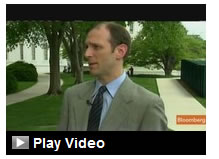Goolsbee on the Slowdown in U.S. Economic Growth, Bernanke Concern Over S&P Rating
Economics / US Economy Apr 29, 2011 - 05:10 AM GMTBy: Bloomberg
 Austan Goolsbee, chairman of the White House Council of Economic Advisers, spoke to Bloomberg TV's Hans Nichols about today's report showing the U.S. economy slowed more than forecast in Q1. Goolsbee said about the S&P's judgment about the U.S.'s triple A rating was "a data point" and he also said that 2011 and 2011 are "still looking fairly positive" for economic growth. Goolsbee appeared on Bloomberg Television's "Bottom Line."
Austan Goolsbee, chairman of the White House Council of Economic Advisers, spoke to Bloomberg TV's Hans Nichols about today's report showing the U.S. economy slowed more than forecast in Q1. Goolsbee said about the S&P's judgment about the U.S.'s triple A rating was "a data point" and he also said that 2011 and 2011 are "still looking fairly positive" for economic growth. Goolsbee appeared on Bloomberg Television's "Bottom Line."
 Goolsbee on the slowdown in U.S. growth:
Goolsbee on the slowdown in U.S. growth:
"It was an expected slowdown. The biggest driver was a reduction in government spending at the federal level, a big negative from defense spending. You saw Bernanke say yesterday and you see the private forecasters say they believe that to be transitory slowdown. Nobody likes a growth slowdown. We've got to have faster growth, but 2011 and 2012 are still looking fairly positive."
On the impact of the price of oil on the U.S. economy:
"We've been tried to analyze that because clearly, that has been hurting consumers. The fact that consumer spending did not fall much, actually came in well better than was expected at 2.7% growth, was a sign that the payroll tax cut of December may be offset in some significant way, whatever was coming by oil. That was at least a positive- it did not look like oil hitting consumers was the thing driving the slowdown."
On whether industrial output next quarter will be impacted by rising oil prices:
"We continue to monitor and try to see that. Overall, since the 1970's, when there were big GDP effects of oil prices, American businesses has got a lot less energy-intensive. Up or down, oil tend to have less impact on GDP growth than they did in the old days."
"In this business, if confidence had been hit by oil prices, you would have thought investment in equipment and software would have gone down but in fact that also came in a little better than expected. So that consumer spending and investment remain relatively strong was a good sign. But we have to keep an eye on the oil prices, for sure."
On jobless claims being up and whether we should be bracing for higher monthly unemployment numbers:
"For sure, you don't want to make too much of any one month of new claims because that is a highly variable statistic…There is a seasonal adjustment problem usually in these weeks. We have had a pretty sustained job market growth, adding jobs in the last two months have been very strong….There can be blips up and down. You shouldn't make too much negative until you see a longer trend than a week or two but we have to get the growth up."
On Bernanke's statements about ending QE2 in June:
"I'm not going to weigh in on their monetary policy decisions. They are independent. I thought Chairman Bernanke did a very effective job explaining what they were doing and where they saw the economy. I thought it very clear. Hopefully, he's not going to put the rest of us out of business."
On whether there is a relationship between the dollar and the price of oil:
"There are a lot of effects. Even Chairman Bernanke said the U.S. Treasury speaks to the government on dollar policy...It is clear that the dollar has gone down and oil prices have gone up. There are some who see some tie to that because the dollar price of oil would go up as the dollar went down and the oil producers might demand higher compensation in dollar currency. On the other hand, the flight to quality that occurred during the downturn and that flight back to normal would look like the dollar going down and the price of oil going up, but that wouldn't mean that one was causing the other. We want to be more circumspect rather than pointing the finger."
On Chairman Bernanke's concerns over the S&P rating:
"There is a call for action to address long-term deficit issues and bring ourselves in fiscal balance. I think the President is pretty committed to that. I thought the judgment in the S&P, which was re-affirming the AAA rating and was just saying something about their opinion about politics in the years to come, I don't know that the S&P has any special expertise on American politics more than you or anybody else does. That's why I thought it was, look, it's a data point, but don't make overly much about it."
Copyright © 2011 Bloomberg - All Rights Reserved Disclaimer: The above is a matter of opinion provided for general information purposes only and is not intended as investment advice. Information and analysis above are derived from sources and utilising methods believed to be reliable, but we cannot accept responsibility for any losses you may incur as a result of this analysis. Individuals should consult with their personal financial advisors.
© 2005-2022 http://www.MarketOracle.co.uk - The Market Oracle is a FREE Daily Financial Markets Analysis & Forecasting online publication.



